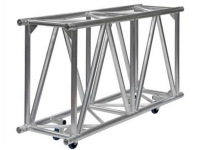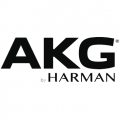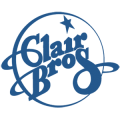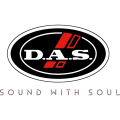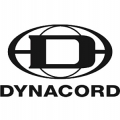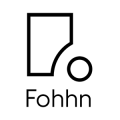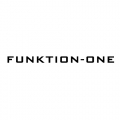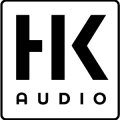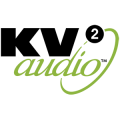ABOUT THE PRODUCT
ABOUT THE MANUFACTURER
GLOSSARY
VerTec VT4880
Dual 18" Arrayable Subwoofer
The VT4880 is a rugged, lightweight, centrally-vented enclosure housing two 18" woofers. These advanced components, each fitted with dual voice coils, provide a high output power-to-weight ratio.
The PlyMax enclosure features: foambacked perforated steel grille speaker cones treated with weather-resistant compounds. Protective end-caps safeguard the suspension hardware while allowing vertical stacking of multiple enclosures on end using integral end-mounted, scuffresistant pads, keyed for aligning surfaces and preventing slippage.
VERTEC suspension systems are engineered for maximum support strength, and flexibility. The VT4880?s suspension hardware (same as the full range VT4889) relies on quick-release pins and endmounted metal frames to couple adjacent units together in rigid arrays. Suspension frames are made from premium-grade chromoly alloy steel with plated surfaces; hinge bars are plated and quick-release pin restraining lanyards are stainless steel to resist corrosion.
The low-frequency capabilities of a multienclosure VT4880 array will be determined by the total number of units coupled. The directivity of a subwoofer line array at any given frequency is proportional to the product of frequency and length of the array. The beamwidth will be inversely proportional to the product of the array?s length and the frequency of interest, typically 20-80 Hz for subwoofer applications.
The more subwoofer elements that are used in the array, the greater directivity will be at lower frequencies, enabling better pattern control. Medium to large arrays can generate extreme amounts of sub-low frequency energy.
Key Features
- Advanced, Ultra Long Excursion Components: Differential Drive Neodymium Magnet, Dual Voice Coil, Direct Cooled cone transducers
- Advanced Technology Components: Differential Drive Neodymium Magnet, Dual Voice Coil, Direct Cooled? cone transducers
- JBL PlyMax engineered wood materials provide rigid, yet lightweight enclosure Rugged DuraFlex exterior finish; weather-resistant components
- Patented, integrated S.A.F.E. suspension system with premium heat-treated alloys Th
Application
The VT4880 Dual 18" Subwoofer Line Array Element is designed to deliver high quality sound reinforcement of sub-low frequencies for a wide variety of live music and A/V support applications. Typical uses include concert audio and multi-media presentations of all types.
Professional used lighting equipment.| Professional second hand lighting equipment.| Professional pre owned lighting equipment.
Professional used audio equipment.| Professional second hand audio equipment.| Professional pre owned audio equipment.
Second hand audio gear. | Second hand lighting.
Pro audio equipment, second hand amplifiers, DJ, second hand sound systems, second hand Microphones, second hand Media Players.
Outdoor & Indoor LED screens for sale, LED mobile truck.
Light trussing, Gebrauchte Veranstaltungstechnik, used stage equipment Stage & Theatre lighting products.
Used JBL
JBL is an American company that manufactures audio equipment, including loudspeakers and headphones. There are two independent divisions within the company; JBL Consumer produces audio equipment for the consumer home market, while the JBL Professional produces professional equipment for the studio, installed sound, tour sound, portable sound (production and DJ), and cinema markets. JBL is owned by Harman International Industries, a subsidiary of South Korean company Samsung Electronics.
JBL was founded by James Bullough Lansing (1902–1949) who was an American audio engineer and loudspeaker designer most notable for establishing two audio companies that bear his name, Altec Lansing and JBL, the latter taken from his initials.Early products included the model 375 high-frequency driver and the 075 ultra high frequency (UHF) ring-radiator driver. The ring-radiator drivers are also known as "JBL bullets" because of their distinctive shape. The 375 was a re-invention of the Western Electric 594 driver but with an Alnico V magnet and a four-inch voice coil. The 375 shared the same basic magnet structure as the D-130 woofer. JBL engineers Ed May and Bart N. Locanthi created these designs.
In 1955 the brand name JBL was introduced to resolve ongoing disputes with Altec Lansing Corporation. The company name "James B. Lansing Sound, Incorporated", was retained, but the logo name was changed to JBL with its distinctive exclamation point.
The JBL 4320 series studio monitor was introduced through Capitol Records in Hollywood and became the standard monitor worldwide for its parent company, EMI. JBL's introduction to rock and roll music came via the adoption of the D130 loudspeaker by Leo Fender's Fender Guitar Company as the ideal driver for electric guitars.
In 1969, Thomas sold JBL to the Jervis Corporation (later renamed "Harman International"), headed by Sidney Harman. The 1970s saw JBL become a household brand, starting with the famous L-100, which was the best-selling loudspeaker model of any company to that time. The 1970s were also a time of major JBL expansion in the professional audio field from their studio monitors.
By 1977, more recording studios were using JBL monitors than all other brands combined, according to a Billboard survey.[5] The JBL L-100 and 4310 control monitors were popular home speakers. In the late 1970s, the new L-series designs L15, L26, L46, L56, L86, L96, L112, L150, and later the L150A and flagship L250 were introduced with improved crossovers, ceramic magnet woofers, updated midrange drivers, and aluminum-deposition phenolic resin tweeters.
In the mid-1980s the designs were again updated and redesigned with a new titanium-deposition tweeter diaphragm. The new L-series designations being the L20T, L40T, L60T, L80T, L100T, the Ti-series 18Ti, 120Ti, 240Ti, and the flagship 250Ti. To test speaker drivers, JBL in Glendale and Northridge used the roof as an outdoor equivalent to an anechoic chamber.
Over the next two decades, JBL went more mass-market with their consumer (Northridge) line of loudspeakers. At the same time, they made an entry into the high-end market with their project speakers, consisting of the Everest and K2 lines.
JBL became a prominent supplier to the tour sound industry, their loudspeakers being employed by touring rock acts and music festivals.
JBL products were the basis for the development of THX loudspeaker standard, which resulted in JBL becoming a popular cinema loudspeaker manufacturer.
Professional used lighting equipment.| Professional second hand lighting equipment.| Professional pre owned lighting equipment.
Professional used audio equipment.| Professional second hand audio equipment.| Professional pre owned audio equipment.
Second hand audio gear. | Second hand lighting.
Pro audio equipment, second hand amplifiers, DJ, second hand sound systems, second hand Microphones, second hand Media Players.
Outdoor & Indoor LED screens for sale, LED mobile truck.
Light trussing, Gebrauchte Veranstaltungstechnik, used stage equipment Stage & Theatre lighting products.
Efficiency Rating: Level of sound output measured at a prescribed distance with a standard input power. Efficiency rating standard is 1 watt (2.83V at 8 ohms) at 1 meter over a specified frequency range and is measured in decibels.
Equalization: Loosely, any type of relative frequency adjustment. Specifically, the process of changing the frequency balance of an electrical signal to alter the acoustical output.
Equalizer: A component designed to alter the frequency balance of an audio signal. Equalizers may be graphic, parametric, or a combination of both.
Fade: A gradual increase in audio, i.e. a fade-up, or a gradual decrease in audio, i.e. a fade-down.
Feedback: The transmission of current or voltage from the output of a device back to the input, where it interacts with the input signal to modify operation of the device. Feedback is positive when it’s in phase with the input and negative when it’s out of phase.
FM: Frequency Modulated.
Frequency: The number of cycles (vibrations) per second. In audio, audible frequencies commonly range from 20 to 20,000 cycles per second (Hz). In video, frequency is used to define the image resolution. Low-frequency video images depict large objects or images. Higher frequencies depict smaller objects (finer details.
Frequency Response: A measure of what frequencies can be reproduced and how accurately they are reproduced. A measurement of 20 to 20,000 Hz, 3dB means those frequencies between 20 and 20,000 Hz can be reproduced no more than 3 dB above or below a reference frequency level.
Full-Range: A speaker designed to reproduce the full range (20 Hz to 20 kHz) of audio frequencies.
Gain: Increase in level or amplitude.
Gooseneck: This refers to a microphone with a flexible neck that is most frequently attached to a podium or lectern. It is designed to allow the speaker to raise or lower the microphone to a suitable height.
Graphic Equalizer: A type of equalizer with sliding controls that creates a pattern representing a graph of the frequency-response changes. Raising sliders boosts the affected frequencies lowering sliders cuts (attenuates) the affected frequencies.
HDCP: High-Bandwidth Digital Content Protection. Created by Intel, HDCP is used with HDTV signals over DVI and HDMI connections and on D-Theater D-VHS recordings to prevent unauthorized duplication of copyright material.
HDR: Hard-Drive Recorder. Device that uses a computer hard drive to store compressed digital audio and video signals.
High Pass: A filter that passes high frequencies, and attenuates low frequencies. Same as low cut.
Hz: Hertz or cycles per second. Something that repeats a cycle once each second moves at a rate of 1 Hz.
Incue/Inq/In-Point: These words all refer to the initial few seconds of audio signifying the beginning of the production.
Integrated Amplifier: A combination preamp and amplifier.
Impedance: A measure of the impediment to the flow of alternating current, measured in ohms at a given frequency. Larger numbers mean higher resistance to current flow.
KHz: Kilohertz or one thousand Hz.
Lavaliere: A small microphone that attaches to clothing, allowing the speaker to have a hands-free presentation.
Line Array: A group of speakers that have been arrayed or "built up" in the vertical or horizontal plane, which allow for a highly consistent sound field. A Line Array is perfect for medium to large audiences.
Line-Level (Low-Level): A level of electrical signals too low to make the average speaker move sufficiently. Amplifiers receive line-level signals and amplify them to speaker level.
lockout: The final words of a segment used to signify the production’s conclusion.
Low Pass: A filter that lets low frequencies go through but doesn’t let high frequencies go through. Same as high cut.
MHz: Megahertz, or 1 million Hz.
Midbass: The middle of the bass part of the frequency range, from approximately 50 to 100 Hz (upper bass would be from 100 to 200 Hz). Also used as a term for loudspeaker drivers designed to reproduce both bass and midrange frequencies.
Midrange: The middle of the audio frequency range. Also used as a term for loudspeaker drivers designed to reproduce this range.
Mixer: This is the unit in which audio signals are directed from. A mixer provides for both mic and line input combinations while allowing you to control one or more outputs.
MLP: Meridian Lossless Packing. Encoding format that is able to completely reconstruct the original signal at the receiving end. No information is lost or discarded, regardless of how trivial it might be. Used to encode six channels of high-resolution audio on DVD-A.
Mono: Monophonic sound. One channel.
MP3: MPEG-1 Audio Layer-3. Compression scheme used to transfer audio files via the Internet and store in portable players and digital audio servers.
Natural Sound (NATS): The nonverbal audio that occurs in a non-studio setting. NATS can be used to help characterize the setting.
Noise: An unwanted portion of a signal such as hiss, hum, whine, static, or buzzing.
Nonlinear Editing: Digital audio systems that allow for clips to be extracted without affecting the master recording.
Professional used lighting equipment.| Professional second hand lighting equipment.| Professional pre owned lighting equipment.
Professional used audio equipment.| Professional second hand audio equipment.| Professional pre owned audio equipment.
Second hand audio gear. | Second hand lighting.
Pro audio equipment, second hand amplifiers, DJ, second hand sound systems, second hand Microphones, second hand Media Players.
Outdoor & Indoor LED screens for sale, LED mobile truck.
Light trussing, Gebrauchte Veranstaltungstechnik, used stage equipment Stage & Theatre lighting products.




